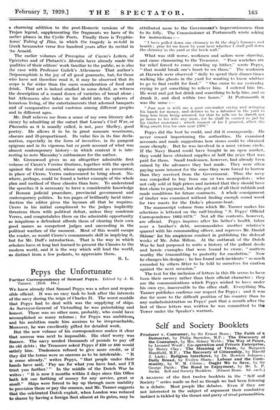Pepys the Unfortunate
Further Correspondence of Samuel Pepys. Edited by J. R. Tanner. (Bell. 18s.)
WE knew already that Samuel Pepys was a sober and respon- sible official. It was no easy task to look after the interests of the navy during the reign of Charles H. The worst muddle that Pepys had to 'deal with was the supplying of ships. As Surveyor-General of Victualling he was painstaking and honest. There was no other man, probably, who could have accomplished so many reforms ; for Pepys was ambitious, and his ambition made him anxious to be irreproachable. Moreover, he was excellently gifted for detailed work.
But the new volume of his correspondence makes it clear that success was next to impossible. His chief worry was finance. The navy needed thousands of pounds to pay off its old debts ; the Treasurer asked Pepys if £50 or £60 would satisfy him. Tradesmen refused to give more credit, or if they did the terms were so onerous as to be intolerable. " It is come already," writes Pepys, " that people under their bands have said, ' Pay me for what you have had, and I'll trust you further. " In the middle of the Dutch War he writes : " It is now 2 months within 2 days since this Office hath felt one farthing of money for any service, great or small." Ships were forced to lay up through mere inability to provision them or pay the seamen, and Mr. Tanner suggests that the celebrated Dutch exploit, when London was reduced to shame by having a foreign fleet almost at its gates, may be attributed more to the Government's impecuniousness than to its folly. The Commissioner at Portsmouth wrote asking for instructions :-
" I have pulled down one chimney to fit the ship's furnaces and hearth ; pray let me know by your next whether I shall pull down the chimney in the yard or the brick wall."
What was still worse, workmen and sailors were starving, and came clamouring to the Treasurer. " Poor wretches are for relief forced to come crawling up hither," wrote Pepys, " that would break one's heart to see them." The workmen at Harwich were observed " daily to spend their dinner-times walking like ghosts in the yard for wanting to know whither to go to find credit for food." " One came to me yesterday crying to get something to relieve him. I ordered him 10s.
He went and got hot drink and something to help him, and so drank it, and died within two hours." At Portsmouth it was the same :-
"Just now is with me a poor oar-maker crying and wringing his hands for money, and desires to be a labourer in the yard to keep him from being arrested, for that he tells me he dareth not go home to his wife any more, for he shall be carried to jail by his timber merchant ; which request of his I granted, albeit the King oweth him for oars near £300."
Pepys did the best he could, and did it courageously. He never ceased importuning the authorities. He examined accounts and made suggestions how stores could be obtained more cheaply. But he was involved in a most vicious circle. If the Navy Board could have bought in an open market, they could have obtained supplies at half the price that was paid for them. Small tradesmen, however, had already been ruined by the advances they had made. They were often paying more interest for the sums they were forced to borrow than they received from the Government. Thus the navy was compelled to buy from one or two monopolists ; who not only sold at high prices and insisted that they should have first claim to payment, but also got rid of all their rubbish and made conditions for future contracts. A whole consignment of timber was examined without fording enough sound wood for two masts for the Duke's pleasure-boat.
The manuscript volume from which Mr. Tanner makes his selections is lettered on the calf-binding " S. Pepys' Official Correspondence 1662-1679." Not all the contents, however, are official. Pepys inquires after his father's health, takes over a brother's debt, accommodates another relative's quarrel with his commanding officer, and reproves Mr. Daniel Skinne7 for his suspicious conduct in publishing the disloyal works of Mr. John Milton. At the outbreak of the Dutch War he had purposed to write a history of the gallant deeds and heroic examples that were bound to ensue, " matters worthy the transmitting to posterity for emulation." Now he changes his designs ; he has found such incidents " so much exceeded by others fitter to be told to ourselves for caution against the next occasion."
The test for the inclusion of letters in this file seems to have
been their secrecy rather than their official character ; they are the communications which Pepys wished to have under his own eye, inaccessible. to the office staff. Everything Mr.
Tanner publishes confirms our respect for Pepys ; and it was due far more to the difficult position of his country than to any maladministration on Pepys' part that a month after the
last of these letters was written he was committed to the Tower under the Speaker's warrant.








































 Previous page
Previous page